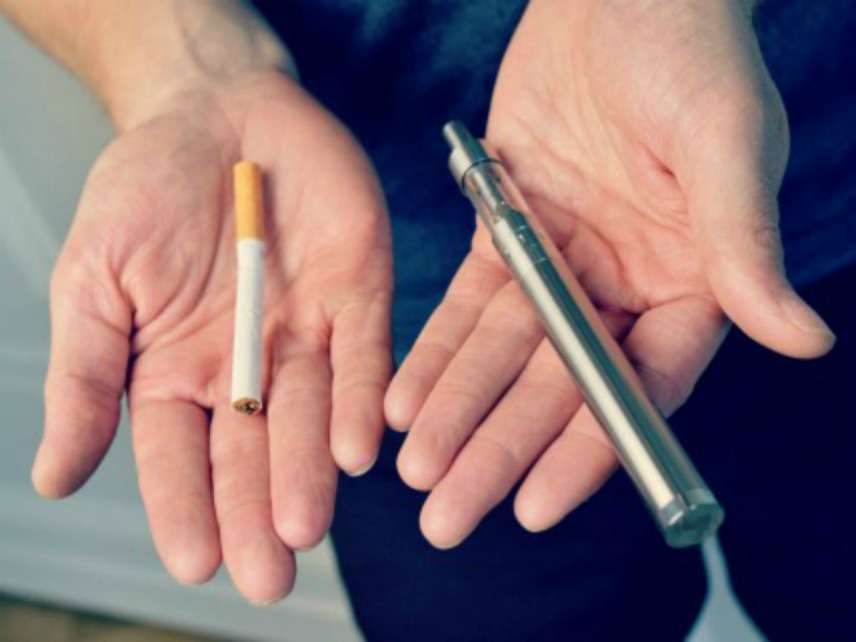The Percentage of Americans Who Understand That Vaping Is Less Dangerous Than Smoking Continues to Fall
Years of mealy-mouthed, misleading, and mendacious statements by activists, government officials, and journalists have taken a toll on the truth.

The percentage of Americans who recognize that vaping is less hazardous than smoking continues to decline, according to a recent analysis of data from two national surveys. The results suggest that years of mealy-mouthed, misleading, and mendacious statements on this subject from activists, government officials, and journalists have taken a toll on the truth, undermining a harm-reducing shift in nicotine consumption that former FDA Commissioner Scott Gottlieb called "a tremendous public health opportunity."
The new study, published online by JAMA Network Open on March 29, is based on data from the Health Information National Trends Survey (HINTS) and the Tobacco Products and Risk Perceptions Survey (TPRPS). Between 2012 and 2017, the authors report, the share of respondents who correctly perceived e-cigarettes as less dangerous than the conventional, combustible kind fell from 51 percent to 35 percent in the first survey and from 39 percent to 34 percent in the second. Meanwhile, the share who incorrectly thought vaping is just as hazardous as smoking rose from 46 percent to 56 percent and from 12 percent to 36 percent, respectively. The percentage who erroneously believed that vaping is more dangerous than smoking tripled in both surveys, reaching nearly 10 percent in HINTS and more than 4 percent in TPRPS.
This decline in understanding about the relative risks of smoking and vaping is especially striking because it happened during a period when the case for the harm-reducing potential of e-cigarettes became steadily stronger. In 2015 Public Health England endorsed an estimate that vaping is something like 95 percent safer than smoking. In 2016 the Royal College of Physicians concluded that "large-scale substitution of e-cigarettes, or other non-tobacco nicotine products, for tobacco smoking has the potential to prevent almost all the harm from smoking." Studies published in 2016 and 2017 showed that smokers who switch to e-cigarettes dramatically reduce their exposure to hazardous chemicals generated by tobacco combustion—as dramatically as smokers who switch to nicotine replacement products such as gum or patches (a finding confirmed by a recent study of Juul e-cigarettes, the dominant brand in the United States).
After Gottlieb took office in 2017, his agency announced its support for switching smokers to less hazardous forms of nicotine consumption, including e-cigarettes, which he said held great promise for reducing tobacco-related disease and death. A controlled, randomized clinical study published in January added support to that position, finding that e-cigarettes were nearly twice as effective in helping smokers quit as the nicotine replacement products that doctors and public health officials have been recommending for years. Despite these developments, smokers are less likely to recognize the lifesaving potential of e-cigarettes than they were in 2012, which means they are less likely to attempt the switch and more likely to start smoking again once they have tried vaping.
What happened? Part of the blame lies with government agencies, including the FDA as well as the CDC and the Surgeon General's Office, that continue to treat e-cigarettes as "tobacco products," even though they do not contain tobacco. When smoking declines while vaping rises, these agencies do not celebrate. Instead they express concern that overall "tobacco use" has not changed or is actually "rising," which is not true and implies that all these products pose essentially the same risks, which also is not true. In an effort to deter teenagers from vaping, these agencies exaggerate the dangers of e-cigarettes, deliberately obscuring the crucial point that vaping is far less hazardous than smoking.
E-cigarette alarmists and their allies in the press add to the confusion. Consider this HealthDay News story about the JAMA Open Network study. "Amid growing concern about the safety of e-cigarettes," reporter Steven Reinberg writes, "more American adults now believe vaping is just as dangerous as smoking cigarettes." They are clearly wrong to believe that, but you wouldn't know it from Reinberg's article, which consists mostly of quotes from anti-smoking activists who are perversely determined to muddy the truth.
"The more we learn about e-cigarettes, the more dangerous they look," says Stanton Glantz. "The fact that the public is perceiving that e-cigarettes are more dangerous over time is, in fact, an accurate perception. The idea that e-cigarettes are harmless is fading away, which is a good thing."
Erika Sward, assistant vice president for national advocacy at the American Lung Association, says it's "foolish" (Reinberg's word) to consider the relative risks of vaping and smoking, because "cigarettes are the most deadly consumer product on the market," which is precisely why it is important to consider the relative risks of vaping and smoking. "The narrative that e-cigarette companies have been pushing since 2009 that these are a safer alternative, that they may help you quit, has been in the Big Tobacco playbook going back to the 1950s," she says. "There is no safe tobacco product, including e-cigarettes."
The issue, of course, is not whether e-cigarettes are "harmless" or "safe" but whether they are less harmful than combustible tobacco cigarettes, and on that point there is no credible disagreement. The authors of the JAMA Open Network study assume as much, which is why they emphasize "the urgent need to accurately communicate the risks of e-cigarettes to the public," saying such communication "should clearly differentiate the absolute from the relative harms of e-cigarettes." Reinberg fails abysmally at that task, leaving readers with the impression that no one really knows whether smokers can reduce the health risks they face by switching to e-cigarettes. That message is not just dishonest but potentially deadly.


Show Comments (70)